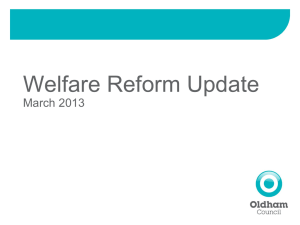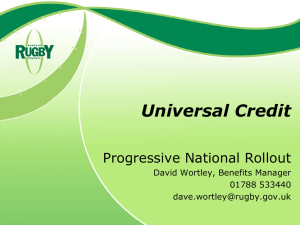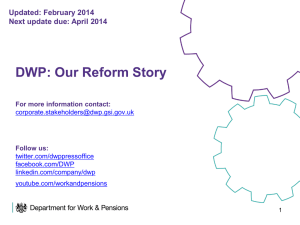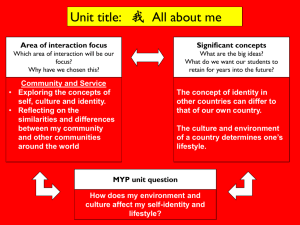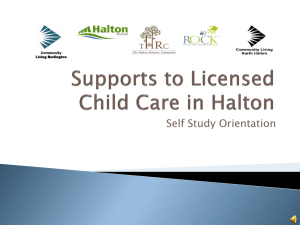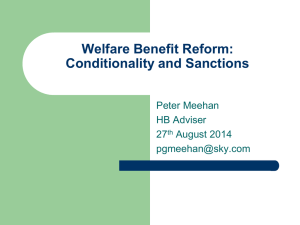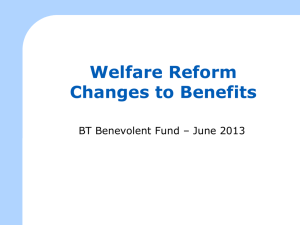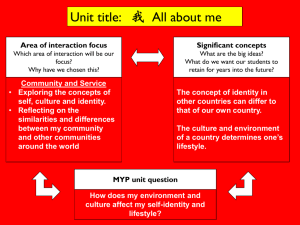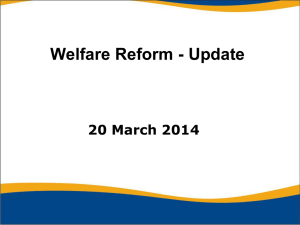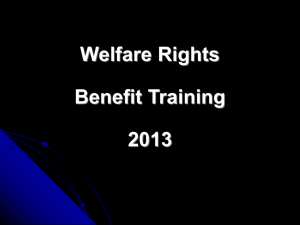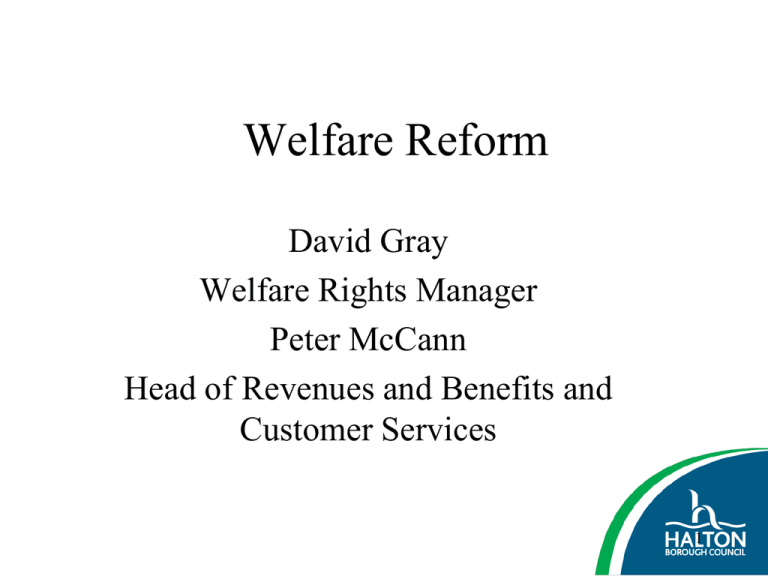
Welfare Reform
David Gray
Welfare Rights Manager
Peter McCann
Head of Revenues and Benefits and
Customer Services
1
Overview of presentation
• 1) Welfare agenda
Dave
• 2) Changes from April Peter
• 3) Longer term changes Dave
2
Welfare Reform Act 2012
• Royal Assent 8/3/12
• Biggest Change to welfare system in 60 years
• Stated intentions of Government
– Make work pay
- Protect the vulnerable
- Fair to tax payers
- Fair to benefit claimants
3
Expenditure savings
4
Measures
• Universal Credit
• Housing Benefit Reform
• Abolition of Council Tax Benefit
• Personal Independence Payments (PIP)
• Employment Support Allowance
• Enhanced benefit sanctions
5
Introduction
1. Bedroom Tax
2. Discretionary Support Scheme
3. Council Tax Reduction Scheme
4. Discretionary Housing Payments
5. Benefits Cap
6. Council Tax Empty Property Charge
Bedroom Tax
Bedroom Tax
One bedroom calculated for each of the following:
• A single claimant or every adult couple
• Any single adult aged 16 or over
• Any two children under age 10
• Any two children of the same sex aged up to 15
• Any other child (other than a foster child or child
whose main residence is elsewhere)
• A non-resident overnight carer
8
Housing Benefit – Bedroom Tax
• Housing Benefit is reduced by making a reduction to
eligible rent
- 14% one room (2,000)
- 25% two rooms (600)
• 2,600 households affected
• Total Housing Benefit reduction is £1.8m
9
Housing Benefit – Bedroom Tax
Exemptions:
• Temporary accommodation
• Supported accommodation
• Claimant or partner qualifies for state pension credit
Protections:
• Recent bereavement – 12 months
• New claim – 13 weeks
10
What is Halton BC doing?
• Supplied lists to RSLs of households affected
• December 2012 - Council wrote to claimants informing of under
occupancy
• Number of bedrooms & household composition
• Amount of Housing Benefit reduction
• Claimants requested to inform HBC if household composition is
incorrect
• Over night care cases identified
• Disabled adaptations identified
11
Non Dependants
• Where are they?
Discretionary Support Scheme
• From April 2013 the Discretionary Social Fund
will end
• From April Halton Council has a new scheme
which may or may not be able to help you
• Not a like for like replacement
Background
• As a result of the Welfare Reform Bill, the national Discretionary Social Fund,
currently administered by DWP, will be disbanded from April 2013
• Crisis Loans for general living expenses and Community Care Grants will be
replaced by new local assistance schemes to be administered by Local
Authorities
• Expected that the grant to LAs will be based on the equivalent social fund
spend 2012-13 (£178m) But Halton £100k down on 2011/2012!
• Will be non-ring fenced
• No new statutory duties to provide local scheme
15
Changes to the Social Fund Scheme from April 2013
Regulated scheme
•
•
•
•
Sure Start Maternity Grants
Funeral Payments
Cold Weather Payments
Winter Fuel Payments
Discretionary scheme
•
•
Remains with
DWP
Budgeting Loans
Crisis Loans
-Alignment Payment
-General living expenses
• Community Care Grants
Locally
designed &
administered
provision
16
Number of Applications
Total expenditure
Number of Awards
received
560
£23,600
150
2,410
£104,800
1,880
Awards 2011/12
2970
£128,400
2,030
6,000
£250k+
4,000+
April to Sept 2011
Updated Full year information
Crisis Loan
Crisis Loan Living
Community
Pro rata
Items
Expenses
Care Grants
Number of Applications received
Number of Applications received
Total expenditure
Total expenditure
Number of Awards
Number of Awards
Actual Total
730
4,940 2,000
5,670
990
£35,300
£213,900£500,000 £249,200
£239,300
230
3,800 1,000
4,030
490
Updated Full year information
Community
Care GrantsActual
Number of Applications received
Total expenditure
Number of Awards
2,200
£504,800
1,000
17
•
•
•
•
No cash
Freephone number
List of considerations reduced
Online applications for support in community
Key Message
• Discretionary Social Fund now no longer exists
• Halton Council may be able to help you
Council Tax Support Scheme
(Abolition of Council Tax Benefit
from April 2013)
20
Current Position
Expenditure:
Housing Benefit
Council Tax Benefit
£52m
£11m
Caseload:
Housing Benefit
Council Tax Benefit
13,014
15,305
21
Current Council Tax Benefit Scheme
Council Tax Benefit caseload & expenditure
Caseload
CTB Expenditure
Passported
4,338
£3.45m
Non passported
2,085
£1.24m
6,423
£4.69m
Passported
6,435
£4.94m
Non passported
2,447
£1.48m
8,882
£6.42m
15,305
£11.11m
Pensioners:
Working Age:
Total
22
Current Position
• Demand led
• Funding- Councils are reimbursed 100% of the full
amount of Council Tax Benefit paid out correctly
• From April 2013 Council Tax Benefit will be abolished
and replaced by a locally designed scheme
23
A Local Scheme - BUT…..
New local scheme should:
•
Protect pensioners ( 41% of Halton’s benefit caseload are pensioners)
•
Take into account vulnerable groups – responsibilities regarding child poverty, the disabled,
homelessness and equalities
•
Incentivise people to work
But:
•
There will be a 10% reduction in funding (equates to £1.4m in Halton)
•
The pensioner protection increases the burden to around 18% for working age claimants
•
Any expenditure above the cash specific sum must be met pound for pound by LA
•
The more people protected the higher the burden
24
The Scheme
• Reduction in non pensioner benefit of a % amount to be deducted at the end of
the calculation
• The % amount to be determined by Members each year once the grant details
have been received
• For 2013/2014 it will be 21.55%
25
The Scheme
• The % reduction ensures that the cut is shared equally
• Retaining present system ensures the in-built protection for various groups is
maintained
• Small sums will be billed ( poll tax)
• Average between £2 & £4 per week
• People billed for the first time
26
General Issues
• Increased cost of recovery
• Small amounts soon become big
• Difficulty in gauging future demand & subsequent financial impact
• 3 schemes will be operating
• Confusion
• Have written to 9,000 households at the start of the year
27
Key Message
• Don’t ignore the Council Tax Bill
• Get in touch with the Council
Benefits Cap
Benefit Cap
• As part of the Welfare Reform Bill, a cap on the maximum amount working- age households
can claim in benefits will be introduced from April 2013 (now summer 2013)
• This is to prevent claimants receiving more income from benefits than the average wage
paid to those who are working.
• The cap is set at £26k per annum (£500 per week for households with children or £350 per
week for single claimants without children).
• Some benefits are excluded such as Working Tax Credits and Disability Living Allowance.
• Department for Work and Pensions (DWP) have written to all households that they think
may be affected.
• DWP have identified 104 households in Halton that may be effected (have incomes of
between £26k and £46k).
• DWP have wrongly identified some clients as being effected.
30
Benefit Cap
• Until the implementation of Universal Credit, the cap will be applied to
Housing Benefit
• Owner Occupiers will not be effected until transfer to Universal Credit
• Claimants likely to see it as a reduction in Housing Benefit rather than a
reduction in overall benefits
• Have written to 100 people
31
Discretionary Housing Payments
Discretionary Housing Payments
• Amount increased from £87k to £282k
• Bedroom Tax alone is £1.8m shortfall
• Publicity states that this will be the safeguard!
Council Tax
Council Tax
• Changes to charges for Empty Properties
• Change to charges for Second Homes
• Everyone currently receiving exemptions have
been notified
Final Message
• Impact on individuals - Social Fund/Bedroom Tax/ CTRS – which do I pay?
• Impact on Halton’s wider community- (less money in economy)
• Collection issues for Council/RSLs
• Confusion & uncertainties for everyone as Government amends legislation
• ‘It won’t affect me’ syndrome - £100m reinforces this
• Capacity issues of Council as its all in one area
• Get in touch
36
Current System
Reformed System
Income related JSA
Income related ESA
Income Support (inc SMI)
Working Tax Credits
Child Tax Credits
Housing Benefit
Disability Living Allowance
Universal Credit
Personal Independence
Payment
Pension Credit, Child Benefit, Carer’s Allowance (will remain)
Council Tax Benefit ( to be replaced)
Contributory JSA and ESA ( now has 52 week limit)
37
Universal Credit
• Single means tested benefit
• Payable in or out of work
• Initially for new claimants- stock transfer to follow
• Oct 2013 for new claims, April 2014 to start transfer ( by Oct 2017)
• Transitional Protection
• Pilots being undertaken
• Digital agenda
38
Universal Credit
39
• Universal Credit will be paid
directly to the customer.
Potential substantial
risk for increase in rent
• Customer will need a bank
arrears
account. (preferably one that
will accept Direct Debits for rent
payments.)
• Will be paid monthly in arrears
and to one person if part of a
couple.
• As yet still no definition of
‘vulnerable’ for payment to go to
landlord.
Personal Independence Payment
(PIP).
PIP
• Replaces DLA for new claimants of working age from April 2013
-10,600 benefit claimants in Halton on DLA
• Points based
• Many currently entitled to DLA would not get PIP
• Intention is to save money
• Disproportionate effect on Halton
• North West pilot
41
PIP
42
Wider Reforms
• Tax Credits
• Eligibility criteria made harsher
Employment Support Allowance
• Existing Incapacity claimants to be assessed against harder criteria
for ESA.
• Substantial proportion move onto Job Seekers Allowance
Child Benefit Reform
Restrictions for Higher Rate Taxpayers
43
The Benefit
Cap
Summer 2013
Council Tax
Reduction
Scheme April
2013
The Bedroom
Tax - Under
occupation
April 2013
Non Dependant
Deductions
increased from
2011 -2014
The
Biggest
Impacts
Incapacity
Benefits
migrating to
ESA
2011-2014
Universal
Credit –
October 2013 2017
DLA/PIP
April 2013
44
Summary of Welfare Reform
• A lot covered very briefly and very complex
• Deserves more detail
• Full detail of changes not yet available
• Intentions – saving money
- less generous to benefit claimants
• Help available through Welfare Rights Service (tel: 0151 511 8930)
45

